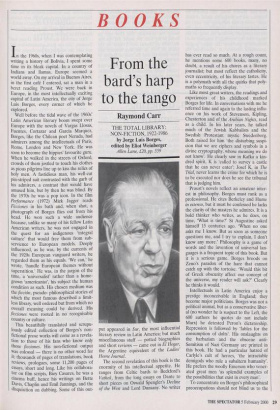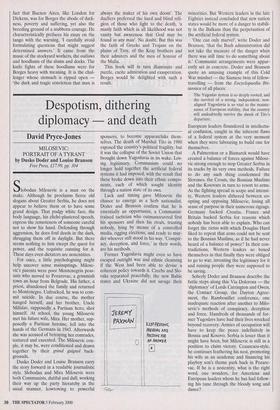BOOKS
From the bard's harp to the tango
Raymond Carr
THE TOTAL LIBRARY: NON-FICTION, 1922-1986 by Jorge Luis Borges, edited by Eliot Weinberger
Allen Lane, .£20, pp. 559 In the 1960s, when I was contemplating writing a history of Bolivia, I spent some time in its bleak capital. In a country of Indians and llamas, Europe seemed a world away. On my arrival in Buenos Aires, in the first café I entered, sat a man in a beret reading Proust. We were back in Europe, in the most intellectually exciting capital of Latin America, the city of Jorge Luis Borges, every corner of which he explored.
Well before the tidal wave of the 1960s' Latin American literary boom swept over Europe with the novels of Vargas Llosas, Fuentes, Cortazar and Garcia Marquez, Borges, like the Chilean poet Nenida, had admirers among the intellectuals of Paris, Rome, London and New York. He was soon to become the hippies' favourite guru. When he walked in the streets of Oxford, crowds of them jostled to touch his clothes as pious pilgrims line up to kiss the relics of holy men. A fastidious man, his well-cut pin-striped suit contrasted with the garb of his admirers, a contrast that would have amused him, but by then he was blind. By the 1970s he was a pop icon. In the film Performance (1972) Mick Jagger reads Ficciones in his bath and, when shot, a photograph of Borges flies out from his head. He won such a wide audience because, unlike so many of his fellow Latin American writers, he was not engaged in the quest for an indigenous 'integral culture' that would free them from sub- servience to European models. Deeply influenced, as he was, by the currents of the 1920s European vanguard writers, he regarded them as his equals. `We can,' he wrote, 'handle European themes without superstition.' He was, in the jargon of the time, a 'universalist' rather than a home- grown 'americanist', his subject the human condition as such. His chosen medium was the ficcion, pseudo- philosophical stories of which the most famous described a limit- less library, well ordered but from which no overall meaning could be derived. His ficciones were rooted in no recognisable country or culture.
This beautifully translated and scrupu- lously edited collection of Borges's non- fictional prose works will come as a revela- tion to those of his fans who know only those ficciones. His non-fictional output was colossal — there is no other word for it; thousands of pages of translations, book reviews, prologues, some 11,200 pages of essays, short and long. Like his collabora- tor on film scripts, Bioy Casares, he was a cinema buff, hence his writings on Bette Davis, Chaplin and Emil Jannings, and the disquisition on dubbing. Some of this out- put appeared in Sur, the most influential literary review in Latin America; but much miscellaneous stuff — potted biographies and short reviews — came out in El Hogar, the Argentine equivalent of the Ladies' Home Journal.
The second revelation of this book is the enormity of his intellectual appetite. He ranges from Celtic bards to Beckford's Vathek, from the long essays on Dante to short pieces on Oswald Spengler's Decline of the West and Lord Dunsany. No writer has ever read so much. At a rough count, he mentions some 600 books, many, no doubt, a result of his chores as a literary journalist; but most reflect the catholicity, even eccentricity, of his literary tastes. He is a polymath with all the quirks that poly- maths so frequently display.
Like most great writers, the readings and experiences of his childhood marked Borges for life. In conversations with me he referred time and again to the lasting influ- ence on his work of Stevenson, Kipling, Chesterton and of the Arabian Nights, read as a child. In his later years, he talked much of the Jewish Kabbalists and the Swedish Protestant mystic Swedenborg. Both raised for him 'the disturbing suspi- cion that we are ciphers and symbols in a divine cryptography, whose meaning we do not know'. He clearly saw in Kafka a kin- dred spirit. K is 'called to survey a castle that he can never enter'; Josef K, in The Trial, never learns the crime for which he is to be executed nor does he see the tribunal that is judging him.
Proust's novels reflect an amateur inter- est in philosophy. Borges must rank as a professional. He cites Berkeley and Hume in extenso, but it must be confessed he lacks the clarity of the masters he admires. It is a bold thinker who writes, as he does, on time, 'What is time?' St Augustine asked himself 15 centuries ago. 'When no one asks me I know. But as soon as someone questions me, and I try to explain, I don't know any more.' Philosophy is a game of words and the invention of universal lan- guages is a frequent topic of this book. But it is a serious game. Borges broods on Zeno's paradox of the hare that cannot catch up with the tortoise. 'Would this bit of Greek obscurity affect our concept of the universe, my reader will ask?' Clearly he thinks it would.
Intellectuals in Latin America enjoy a prestige inconceivable in England; they become major politicians. Borges was not a political animal, but as a conservative liber- al (no wonder he is suspect to the Left, the 600 authors he quotes do not include Marx) he detested Peron's dictatorship. Repression is followed by 'fables for the consumption of dolts'. His onslaughts on the barbarism and the obscene anti- Semitism of Nazi Germany are printed in this book. He had a particular hatred of Carlyle's cult of heroes, 'the intractable demigods who rule a subaltern humanity'. He prefers the woolly Emerson who vener- ated great men 'as splendid examples of the possibilities that exist in every man'.
To concentrate on Borges's philosophical preoccupations should not blind us to the fact that Buenos Aires, like London for Dickens, was for Borges the abode of dark- ness, poverty and suffering, yet also the breeding ground of a stubborn courage. He characteristically prefaces his essay on the tango with the warning, 'I carefully avoid formulating questions that might suggest determined answers.' It came from the music of the stockyard workers, the outlaws and hoodlums of the slums and docks. The knife fights of these hoodlums were for Borges heavy with meaning. It is the chal- lenger whose stomach is ripped open — 'the dark and tragic conviction that man is always the maker of his own doom'. The duellers preferred the hard and blind reli- gion of those who fight to the death, 'a manly faith which in all likelihood was not vanity but awareness that God may be found in any man'. No doubt. But this was the faith of Greeks and Trojans on the plains of Troy, of the Kray brothers and their admirers and the men of honour of the Mafia.
This book will in turn illuminate and puzzle, excite admiration and exasperation. Borges would be delighted with such a result.



























































 Previous page
Previous page